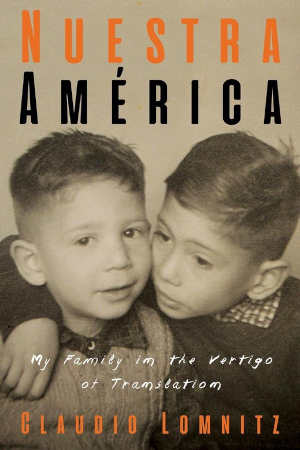Claudio Lomnitz Nuestra América recensie en informatie over de inhoud van deze joodse familiegeschiedenis. Op 9 februari 2021 verschijnt bij Uitgeverij Other Press het nieuwe boek van de Amerikaanse antropoloog en histroricus Claudio Lomnitz. Er is geen Nederlandse vertaling van dit boek verkrijgbaar.
Claudio Lomnitz Nuestra América Recensie en Informatie
Als de redactie het boek gelezen heeft, kun je op deze pagina de recensie en waardering vinden van de joodse familiegeschiedenis Nuestra América, My Family in Vertigo of Transition. Het boek is geschreven door Claudio Lomnitz. Daarnaast zijn hier gegevens van de uitgave en bestelmogelijkheden opgenomen. Bovendien kun je op deze pagina informatie lezen over de inhoud van dit boek van de Amerikaanse antropoloog en historicus Claudio Lomnitz.
Nuestra América
My Family in the Vertigo of Transition
- Schrijver: Claudio Lomnitz (Verenigde Staten)
- Soort boek: familiegeschiedenis, non-fictie
- Taal: Engels
- Uitgever: Other Press
- Verschijnt: 9 februari 2021
- Omvang: 352 pagina’s
- Uitgave: Gebonden Boek
Flaptekst van het boek van Claudio Lomnitz
A riveting exploration of the intersecting lines of Jewish and indigenous Latin American thought and culture, by way of a family memoir.
In Nuestra América, eminent anthropologist and historian Claudio Lomnitz traces his grandparents’ exile from Eastern Europe to South America. At the same time, the book is a pretext to explain and analyze the worldview, culture, and spirit of countries such as Peru, Colombia, and Chile, from the perspective of educated Jewish emigrants imbued with the hope and determination typical of those who escaped Europe in 1920s.
Lomnitz’s grandparents, who were both trained to defy ghetto life with the pioneering spirit of the early Zionist movement, became intensely involved in the Peruvian leftist intellectual milieu and its practice of connecting Peru’s indigenous past to an emancipatory internationalism that included Jewish culture and thought. After being thrown into prison supposedly for their socialist leanings, Lomnitz’s grandparents were exiled to Colombia, where they were subject to its scandals, its class system, its political life. Through this lens, Lomnitz explores the almost negligible attention and esteem that South America holds in US public opinion. The story then continues to Chile during World War II, Israel in the 1950s, and finally to Claudio’s youth, living with his parents in Berkeley, California, and Mexico City.
Writing in a vivid, engaging style, Lomnitz creates an intellectual space that transcends the family memoir genre, where the exploration of one past, origin, and culture is placed in a dialectical relationship with the background of a renowned anthropologist specializing in Latin American history and culture.

